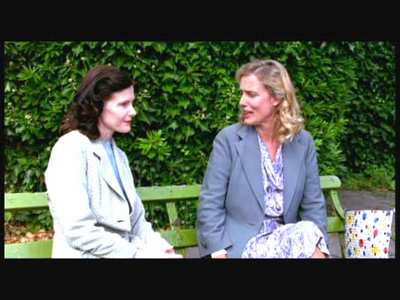Review of Between Two Women
Introduction
Huddersfield, 1957. Geoff Hardy (Andrew Dunn) is wasting his life away in the plethora of mills that scar the local landscape, and just wants his tea on the table when he gets home. His wife Ellen (Barbara Marten) is not happy with the life of domesticity that she succumbed to upon her marriage. Her young son is showing some artistic talent under the tutelage of schoolteacher Kathy Thompson (Andrina Carroll), so much so that Kathy wants to place a drawing of his in a local art exhibition. The discussions between mother and teacher lead to feelings that Ellen does not want to admit, although Geoff can clearly see something is going amiss within his already troubled marriage.
The events of the summer of 1957 bring matters to a head and both Kathy and Geoff are forced to examine what they both want from life…
Between Two Women won the Best Feature Award at the 2003 Lesbian & Gay Film Festival.

Video
A good clear picture and some good period attention to detail. A lot of effort has clearly gone into the design of this film, and for some members of its audience it will be like stepping directly into their past.

Audio
A Dolby Digital 2.0 Stereo mix that is more than adequate for this film. Regardless of where the action is, there always appears to be a train in the background somewhere. The electronic choral score by Michael Hammer seems slightly at odds with the bleak and gritty Northern feel of the film, but it does work. Very simplistic but soothing.

Features
Making Of - follows the norm, quite interesting.
Deleted Scenes - doesn`t follow the norm here. The scenes are all rolled up into a 20 minute featurette that also contains footage of writer.director Steven Woodcock explaining what was cut and why.
Trailer - quite a long trailer really and gives quite a bit away
Star Biographies - text-based biographies of Andrew Dunn and Barbara Marten
Principal Cast list - suppose it saves you watching the credits…

Conclusion
Sedate would be one word to describe this film. Painfully slow would be another. Nothing appears to happen. For all the talk of a great forbidden passion, all we see on screen is moody looks between all the protagonists. Even Andrew Dunn, who I class as a great British actor, seems to just accept what is happening to his marriage almost placidly, which goes against the accepted anger and humiliation that men are supposed to feel when their wife decides to leave them for another woman. Or maybe the accepted view is all wrong, I`m not quite sure, but then this was 50`s Britain and not the liberal new millennium. Either way, the films starts and then meanders to what passes as the end in a somewhat unsatisfying way.
I know from the Making Of featurette that Stephen Woodcock isn`t interested in the more salacious parts of lesbian love, but if he wants to ignore those more obvious aspects of this unlikely relationship then he has to have a decent story to go with it. I really hate early evening Sunday TV dramas but the average episode of Heartbeat or Where The Hearts Is has more happening and feels more satisfactory than this.
On top of this, the director seems to be playing out a young boys dream with lots of references to trains throughout his film. There always seems to be train sounds in the background wherever the characters appear to be in Huddersfield. One of the big scenes with the son in this film involves the setting up of an old Hornby train set that the camera then spends more than a few minutes both tracking the train on the circular track and then switching behind front and back focus shots in a horizontal view of the locomotive. Obviously has one set up in his attic, I`d guess.
Despite the lack of action, bedroom or otherwise, the film is well acted. Dunn is a giant as the prehistoric working class man, Marten shines as the confused housewife who can finally see the fog lifting from her life and Caroll is pale, smiley and slightly mysterious as the teacher who steals her heart. The look and feel of this film is something to be proud of, it`s just a shame that it`s let down by a script that doesn`t really explore the situation more. The British as a race have this reputation, deserved in my view, of being reticent and being ashamed of talking about their feelings with everything important being left unsaid and trivia passing as deep conversation. It`s clear that Woodcock believes this as the final scenes between man and wife show, but there has to be something more to hold your attention, and sadly this script just doesn`t have it.
Not a complete waste, but sadly just may be someone`s cure for insomnia.
Your Opinions and Comments
Be the first to post a comment!